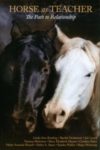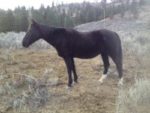The Do’s & Don’ts of Laminitis (Part 1)
This is a very interesting and informative article by Marijke van de Water, Equine Health & Nutrition Specialist, Homeopathic Practitioner, and Medical Intuitive & Healer, which outlines a few “do’s and don’ts” for ensuring the optimal health of a laminitic horse. This is Part 1 – stay tuned for Part 2!
First, let’s start with the “don’ts”:
~~~~~~~~~~~~~~~~~~~~~~~~~~~~~~~~~~~~~~~~~~~~~~~~~~~~~~~~~~~~~~~~~~~
The Don’ts
Don’t put a laminitic horse on pasture – fresh grass is very high in sugar, especially in the spring, summer and the hottest part of the day.
Don’t feed oats, barley, corn, COB, grains or any other commercial grain feeds including extruded feeds – these (as well as grass) are all high in sugar and non-structural carbohydrates which increase blood sugar, insulin levels and cecal acids and toxins – all major causes of lamina inflammation.
Don’t feed high fat feeds or added oils. While current popular opinion promotes feeding horses poor quality fats for “cool” energy and for lowering the glycemic index of forage and grain, fats and oils congest the liver and lymph system, slow down digestive transit time, impede nutrient absorption, contribute to leaky gut, have no nutritional value and increase cortisol levels which elevates blood sugar.
Don’t feed alfalfa. While the high protein levels in alfalfa will lower the glycemic index and stabilize blood sugar in SOME horses, excess alfalfa will exacerbate laminitic symptoms in most horses by contributing to a leaky gut and/or by increasing the deposition of acids into the hoof joints.
Don’t soak your hay for longer than two to three weeks – any longer than that could increase hunger and stress levels as the sugar and/or protein levels may become deficient. Any hay that needs to be soaked long-term to maintain weight or soundness is not the right hay.
Don’t starve the overweight laminitic/metabolic horse – this creates stress causing unbalanced insulin levels, increased cortisol production, poor immunity and an increase in hoof inflammation. Feed small amounts of forage frequently by using slow feeders.
Stay Tuned for Part 2
In Part 2, we will share Marijke’s words on a few more “do’s and don’ts” to ensure the optimal health of a laminitic horse.
More from Marijke van de Water:
Website: http://www.rivasremedies.com
Twitter: @rivasremedies
Facebook: facebook.com/rivasremedies1


